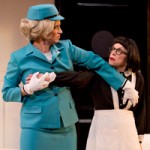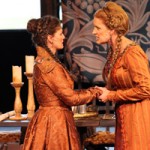Uncomfortable topics of class resentment, social divide and personal pride wrestle onstage in David Lindsay-Abaire’s Tony Award-nominated play, Good People, currently playing at the Arts Club Theatre’s Stanley Industrial Alliance Stage.
In fact, the title Uncomfortable was contemplated before settling on Good People. Returning to the style of Lindsay-Abaire’s Pulitzer-winning work, Rabbit Hole, this naturalistic drama is based out of the playwright’s own hometown of south Boston — “Southie”.
Armed with first-hand knowledge, the playwright portrays an insular town of low incomes and even lower hopes where “good” people refers to folks just like you and me, not necessarily to their virtue.
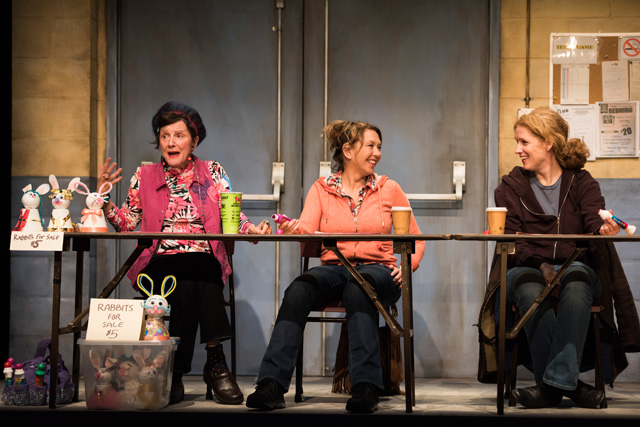
[Patti Allan, Jenn Griffin, Colleen Wheeler]
In its entirety, the production is solidly entertaining but there are bits where the characters are trite and the narrative too predictable. However, the story does leave the audience wondering whether remaining “good” implies staying poor while prosperity impels villainy. Is success a matter of luck — or labour?
Margie (pronounced with a hard “g”) has lost her job at the dollar store for repeated lateness. She argues with her boss Stevie that it’s not her fault because her landlord/babysitter, Dottie, is always late to look after her severely-handicapped daughter, Joyce.
Dottie contends that it’s not her fault either because Margie doesn’t pay very much. So whose fault is it that Margie can’t afford to find a different sitter and Dottie can’t be bothered to care more? These are honest types just trying to get by. Is there a better choice, or more evident, why can’t Margie catch a break?

[Colleen Wheeler, Scott Bellis]
This break comes when Margie learns that her old flame, Mikey, has returned to Southie and is now a successful doctor. Believing that “he was always good people,” Margie calls his office in hopes he can offer her a job. A practical and bold woman, Margie goes in person when she gets no reply.
To her disappointment, the reunion is awkward and labored. Since moving away to college, Mike has clearly moved up in the world and, although comfortable with his new status, is not comfortable with her presence.
He recalls the “old times” with romanticism and is convinced his success is due to his own diligence rather than luck. He has no empathy for Margie’s chronic downtrodden state even though they came from the same neighbourhood. Undaunted, Margie humiliates Mike into inviting her to his birthday party in hopes one of his well-heeled friends has job prospects. After he calls to announce that the party has been cancelled because his daughter is sick, Margie assumes he is embarrassed about her and shows up at his doorstep anyway. She is desperate for a job, any job.
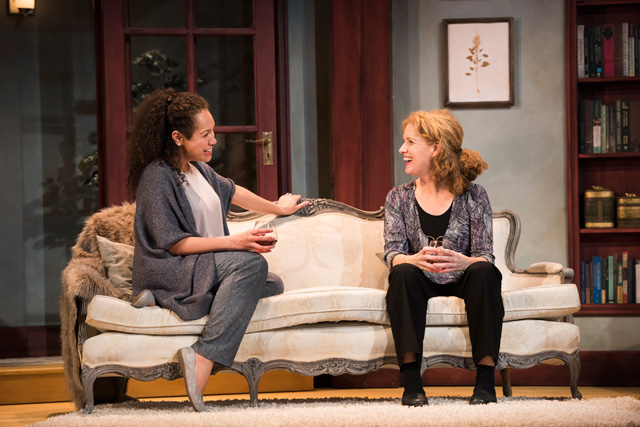
[Sereana Malani, Colleen Wheeler]
Her impetuous action brings about the collision of worlds when she meets Kate, Mike’s African-American wife, in their spacious home atop Chestnut Hill. Years of repressed bitterness, regret and spite burst the surface as the intersection of economic classes scrap it out. Mike cannot be entirely faulted for wanting to better himself; Margie cannot be entirely faulted for trying to make a living. Is it everybody and nobody’s fault alike?
Colleen Wheeler embraces a wily, wounded and vindictive Margie Walsh with poignant precision. Margie is a destructive victim-heroine. She may not have the education afforded Mike and Kate but they are no match for her verbal backbites or disingenuous compliments. Wheeler’s superb comedic timing is attune with Scott Bellis’ version of Mike Dillon as a conflicted elitist coward.
Comfort and success has allowed Mike to cocoon himself from his humble roots and the struggling poor. To prove his complete self re-invention he even married an upper class African-American wife, immodestly played by Sereana Malani. Unlike Margie, her determination is a by-product of positive reinforcement rather than circumstance. She transforms from charming hostess to judgmental virago when her bubble existence is threatened.
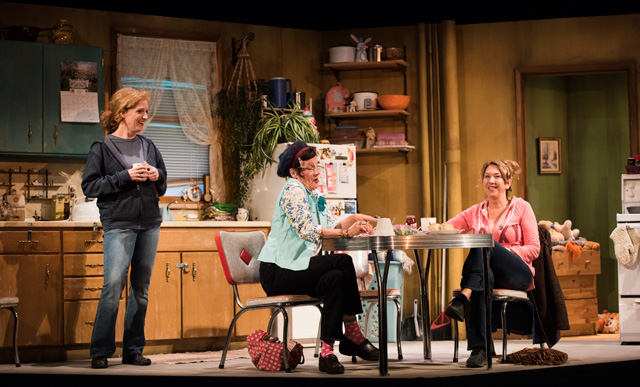
Lauchlin Johnston’s realistic set is tetris-magic: scenes slide into place and break apart like a jigsaw puzzle. Even the knickknacks are befitting: Margie’s tenement apartment is cramped and utilitarian while Mike’s house is roomy and tastefully decorated.
The simplistic, snappy dialogue in Good People is deceptive. Laced with barbed sarcasm, South Boston idioms and concealed meanings, the show comes off more as a comedy than a tragedy, judging from the laughter in the theatre. Lindsay-Abaire has delicately avoided a didactic play about class by encompassing it in a moral-theological framework. The themes of chance versus choice, repeated throughout, is hilariously obvious in the bingo hall scenes.
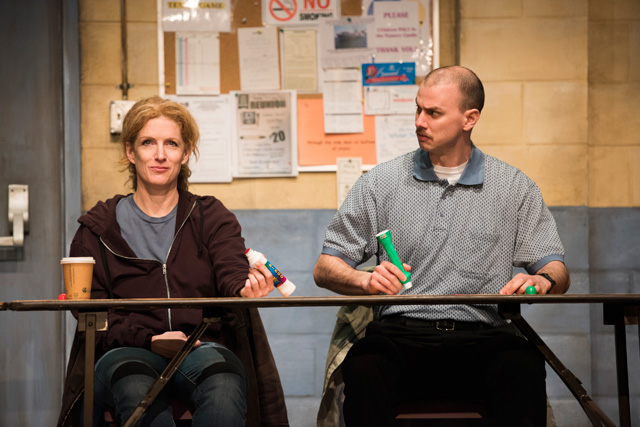
[Colleen Wheeler, Ben Elliott]
Chances are the playwright meant for audiences to enjoy his play as an engaging glimpse into the plight of the Southie milieu. Whether affluent patrons will truly empathize may not be a matter of choice.
Good People continues at the Stanley Industrial Alliance Stage through April 24. Photos by Emily Cooper.


